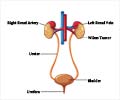a non-invasive technique called percutaneous cryoablation can be of significance in killing kidney tumors by freezing them.
A new study by researchers from the Mayo Clinic in Rochester, MN has found that a non-invasive technique called percutaneous cryoablation can be of significance in killing kidney tumors by freezing them. This method is especially useful in patients who are not considered good candidates for surgery.
For the study, researchers treated 59 kidney tumors in 58 patients using percutaneous (through the skin) cryoablation. The researchers found that the tumors were destroyed in 57 of the 59 cases.After an average follow-up of nine months for the 42 tumors that were available to the researchers, no tumor progression was found. The traditional treatment for worrisome kidney tumors has been surgery, according to the researchers. "A relative drawback of surgery is its invasiveness, where a large incision or several smaller incisions are required. Recovery for surgery may be prolonged, on the order of weeks. In contrast, percutaneous cryoablation is performed through small nicks in the skin, and the patient is dismissed from the hospital within 24 hours with a few band-aids," said Thomas Atwell, MD, one of the authors of the study.
Percutaneous cryoablation is performed while the patient is under general anesthesia. Using real-time ultrasound for guidance, one or more cryoprobes are placed through the skin into the kidney tumor. The tumor is then frozen over the course of about 30 minutes. "We can literally watch the evolving ice-ball grow from the cryoprobes and encompass the tumor. The freezing temperatures destroy the tumor cells and, based on short-term follow-up, results in complete destruction of the tumor in over 95% of cases," said Dr. Atwell.
However, say the researchers, not all tumors are amenable to cryoablation, usually because the tumor lies too close to critical abdominal organs that could be injured by the ice-ball or because of the tumor's size. For this study, the researchers were able to treat tumors up to 7 cm in size. "Based on our early experience, percutaneous kidney cryoablation appears to provide an important alternative method of kidney tumor treatment for select patients. Longer term follow-up will be necessary to determine true treatment durability," said Dr. Atwell.
The full results of the study will be presented on Monday, May 1, 2006 during the American Roentgen Ray Society Annual Meeting in Vancouver, BC. Source: Eurekalert











